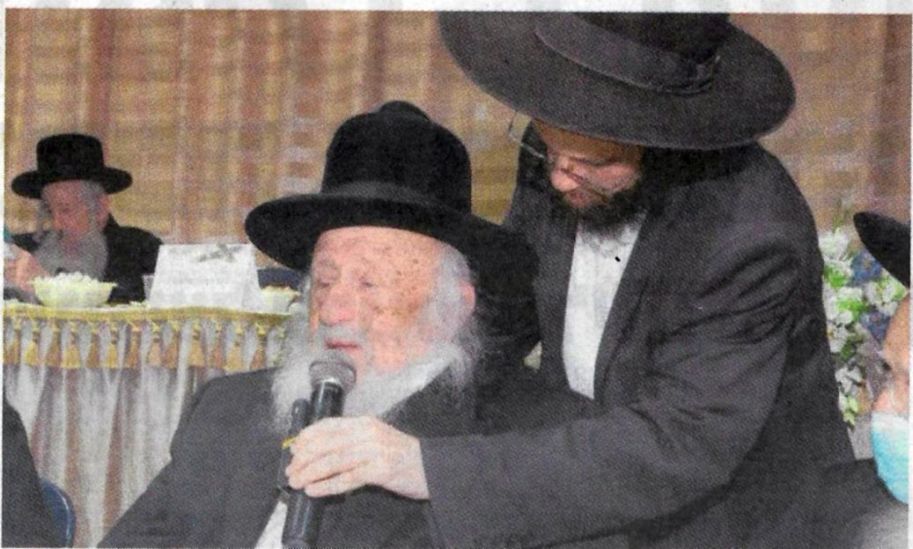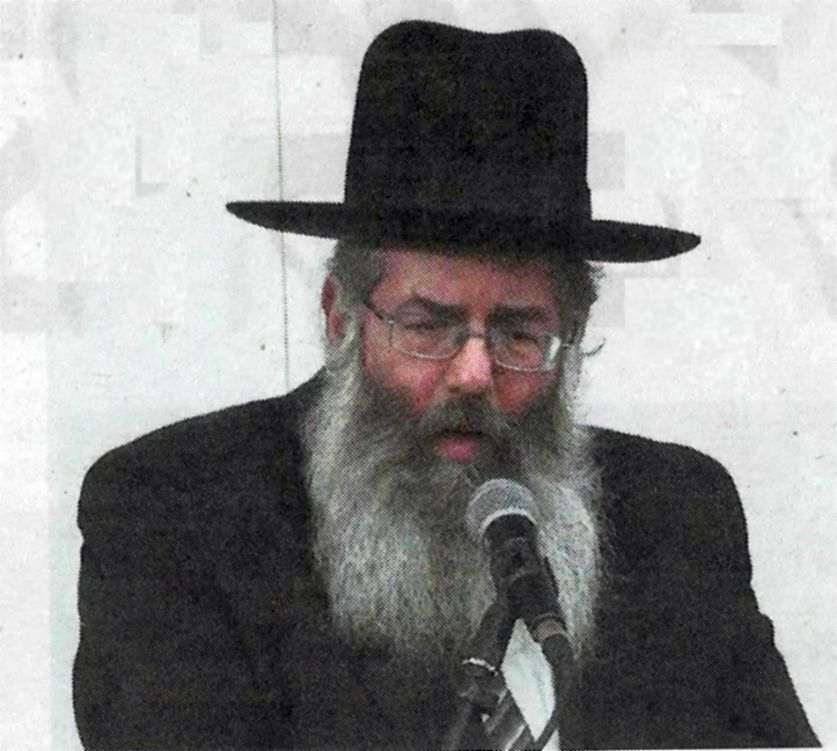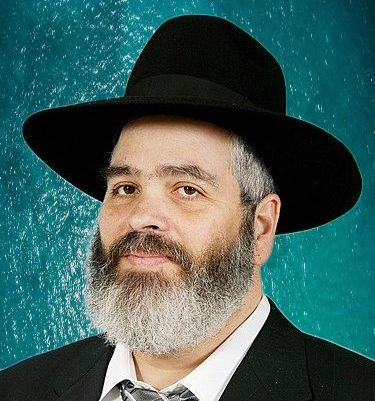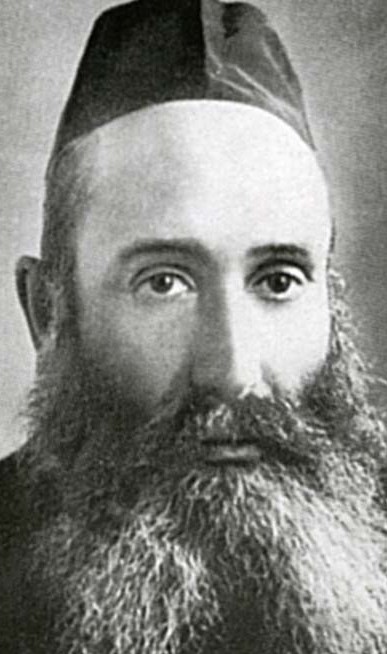  |
|
| |||||
This Google Custom Search looks only in this website. Maran HaRav Berel Povarsky shlita says the only Hope is Torah Learning
In these past day, HaRav Shalom Cohen, Rosh Mesivta of "Derech Emunah", founded by HaRav Chaim Kanievsky ztzvk"l, visited the home of the president of the kollelim, HaRav Dov Povarsky, asking to hear and convey to others the word of Hashem in these challenged days, preceding his imminent chizuk trip to the U.S. and Mexico to uplift the communities of his various past talmidim in both countries.
Maran:
Klal Yisroel finds itself in grave danger. The only thing that can save us is Torah study. "Not with the force of arms but only through My spirit, says Hashem, the L-rd of Hosts."
We must internalize this: we are in danger. Hamas seeks to destroy us and the only deterrent is our Torah study, which is our life and the length of our days and in it must we delve by day and by night. Our very lives are dependent upon the merit of our Torah study. Thus, whoever helps in perpetuating Torah is verily saving our entire People. It is a basic and pivotal fact.
Those who support avreichim and yeshiva students are privileged that Heaven will testify that they preserved the Jewish People...
Last week we were privileged to gather by HaRav Dov Lando, who derided us vociferously for not living with a constant awareness of the danger which faces us these days, surrounded as we are with bloodthirsty enemies, both within and out, who declare full voice their determination to destroy, kill and obliterate all of the Jews in Israel, Hashem forfend. Their hands are quick on the draw of newer, more sophisticated weapons which can reach every spot in the country.
It is our obligation to cry out and trumpet our voices to Hashem to have compassion and mercy on the remnant of our people that He rescue us and speedily redeem us. We must shout from the very depths of our heart, as the Rambam says in his introduction to the laws of fasting: "It is a positive mitzvah from the Torah to cry out to Hashem in every time of trouble lest it truly befall us."
Our prayer and outcry to Hashem is the very purpose of our being threatened with troubles and suffering in our exile — so that we draw closer to Him and return to Him. What has been facing us since Simchas Torah till today seems to be the realization of the prophecy in Hoshea 2:16-17 and Rashi's commentary:
This past Sunday, the Cabinet dealt for the first time the question of the upcoming month of Ramadan which will fall in three weeks' time. This month is notoriously difficult and dangerous since the Moslems regard it as an opportunity to give vent to their bloodthirsty natures.
Islam sees this month, in which its followers fast each day, as a sanctified month, one of brotherhood and celebration. This is how it is defined in the encyclopedia: "Moslems relate to this month as one of inner contemplation and heartfelt effort in self-improvement with an emphasis on modesty and containment. It is meant to be an atonement for sins, engagement in acts of mercy and empathy with [those suffering from] want and hunger experienced by the poor."
Indeed, this is not a joke! It is written black on white. And yet, each time it comes round, we are profoundly apprehensive of the imminent bloodshed of innocent people.
This was originally published exactly 30 years ago in 5754, on the first yahrtzeit of HaRav Grossbard zt"l. This is the first time it is being published online. There is very little information available about HaRav Grossbard online.
Conclusion
We have been following Reb Nochum Abba on his journey through the prewar yeshiva world and begin the third and final part of this series with his arrival in Kaminetz.
With Reb Boruch Ber
Towards the end of his life, Reb Shimon Shkop grew extremely weak and virtually stopped delivering shiurim. A group of Grodno bochurim then decided to attend the lectures of the other great teacher of the generation, who was famous throughout the yeshivos, HaRav Boruch Ber Leibowitz, the rosh yeshiva of Knesses Beis Yitzchok in Kaminetz.
Reb Nochum Abba travelled to Kaminetz in 5799 (1939) and quickly drew close to Reb Boruch Ber, who in turn, gave his new talmid the full benefit of his own deep wisdom. One of the Kaminetz talmidim recalls the strong impression which Reb Nochum Abba, with his sterling character and his continual striving for progress, made on the bochurim of Kaminetz upon his arrival in the yeshiva.
The significant differences between Reb Shimon's and Reb Boruch Ber's approaches in understanding many pivotal concepts in the gemora were apparent from Reb Nochum Abba's very first Torah discussion with the Kaminetz rosh yeshiva when he sought admission into the yeshiva. Nevertheless, during that discussion, Reb Boruch Ber also conversed with Reb Nochum Abba at great length on the subject of Reb Shimon's greatness.
...
Rain and Kinneret Watch by Dei'ah Vedibur
Staff
Our weekly report of the rain and the level of the Kineret -
Winter, 5784.
* * *
Outstanding Articles From Our Archives
IN-DEPTH FEATURES
by Binyomin Y. Rabinowitz
The Maharal's Greatest Feat
HaRav Meir Arik zt'l was once asked whether the Maharal of Prague really made a golem. He replied that he didn't know the answer to the question but that the Maharal's having produced a talmid like the Tosafos Yom Tov was a far greater feat! (Zer Zahav, p. 40, Bilgoray 5693 (1933)
Whether or not the Maharal ever made a golem remains unclear. Doubt arises mainly from the failure of the principal historians of the times to mention a word about the subject. In his forthcoming book, Rabbi Yitzchok Nachman Eshkoli (author of Tzaar Baalei Chaim Behalochoh Uve'agoddoh) discusses the nature and laws governing creatures - such as a golem - created according to Sefer Yetziroh. His new book contains many fresh details about the golem story and this article presents his main conclusions about the episode.
In recent years, controversy has once again raged over the veracity of stories that have been published about the Maharal's creation of a golem. Irrespective of the accuracy of these particular tales, it is clear that many holy tzaddikim of previous generations did possess knowledge of the secrets governing the creation of men and animals, based on Sefer Yetziroh.
Secrets of Sefer Yetziroh
Several seforim contain allusions to this type of creation. The gemora mentions the creation of a man and a calf in this way (Sanhedrin 65, 67). Additional, reliable sources attest to other tzaddikim who have done so. Sefer Yetziroh, whose authorship is ascribed to Avrohom Ovinu, discusses amongst other things the letters of the alef-beis and their various combinations through which our world and its contents were created. Rashi tells us, " `G-d understood its path [i.e. of Torah wisdom] and knew where its place is' (Iyov 28:23) - He looked into it and created the world through its letters; in their order and balance He formed every creature, as is written in the secret of Sefer Yetziroh."
Home and Family
by Rebbetzin Nomi Travis
Question:
"I'm what people call an older single. I've tried varied forms of hishtadlus to find my zivug. My dear ones stress: "You have to make your hishtadlus, then trust in Hashem for the rest." I have heard this or something like it parroted countless times in regard to that fine balance between leaving things in the hands of Hashem and putting forth one's own effort.
On the other hand, I've heard in the name of some Gedolim that the main hishtadlus for shidduchim is prayer. What does that mean? There is no end to the prayers composed for finding one's basheret. At the same time, one can always call more shadchanim and look for extra segulos. Please, matchmaker, I'm interested to hear from your experience and research.
ANSWER:
The sages wrote at length about faith vs. hishtadlus. We are often faced with this question - if I am supposed to trust the Almighty anyway, how much practical effort am I responsible for?
The first and foremost thing to keep in mind is that Hashem runs the show. So where does effort fit in? How do I know when I've successfully volunteered my exertion? How do I know at what point I can say, "It's now out of my hands?"
Most of the following explanations were based on the sefer Kaveh El Hashem by Harav Yitzchok Kaufman, Shlita:
Destiny and Spiritual Development
|
|||||




.jpg)



